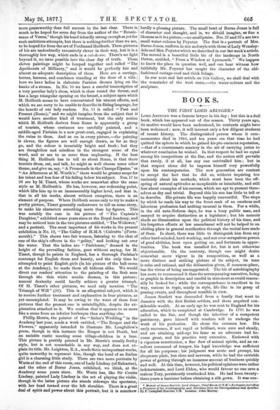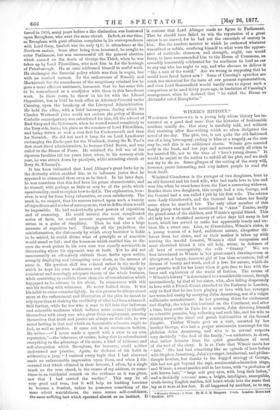BOOKS.
THE FIRST LORD ABINGER.*
LORD ABINGER was a famous lawyer in his day ; but this is a dull book, which has appeased out of due season. Thirty years ago, its motive would have been understood, its contents might have been welcomed ; now, it will interest only a few diligent students of, recent history. The distinguished person whom it com- memorates died in 1844, and ten years ere that time he had quitted the sphere in which he gained his pre-eminent reputation, —that of a consummate mastery in the art of carrying juries to whatever conclusion he wished. In that respect he had no equal among his competitors at the Bar, and the notion still prevails that rarely, if at all, has any one outrivalled him ; but in that respect alone did he impress himself very powerfully upon his contemporaries. The new generation are content to accept the fact that he did so, without inquiring too curiously about his methods, which must have been the off- spring of natural aptitudes as inexplicable as inimitable, and still less about examples of his success, which are apt to present them- selves as dry and trivial. Beyond this his son has little to tell or to describe. His private life was happily uneventful. The steps by which he made his way to the front rank of an emulous and laborious profession had nothing unusual in them. For a while, in the old ante-Reform days, he was a busy public man, and essayed to acquire distinction as a legislator ; but his memoir sheds no illumination upon the political history of his time, and his forgotten efforts at law amendment will not be helped to an abiding place in general recollection through the recital here made of them. In short, there was little to distinguish him from any other hard-minded, hard-working, and not over-scrupulous person of good abilities, bent upon getting on, and fortunate in oppor- tunities. The book was uncalled for, but is not otherwise objectionable. On the contrary, though one might desire somewhat more vigour in its composition, as well as a more distinct and striking picture of its subject, its tone is calm and rational, and the delineation given, if common-place, has the virtue of being unexaggerated. The bit of autobiography has more to recommend it than the accompanying narrative, being as graphic in description and candid in statement as could reason- ably be looked for ; while the correspondence is excellent in its way, various in topic, manly in style, life-like in its grasp of passing events, and throughout sensible in view.
James Scarlett was descended from a family that went to Jamaica with the first British settlers, and there acquired con- siderable wealth. At an early age he was sent to England for his education, which he completed at Cambridge. In 1791 he was called to the Bar, and though the inheritor of a competent patrimony, gave himself with resolute will to undergo the work of his profession. He chose the common law. His early successes, if not rapid or brilliant, were sure and steady, and ere attaining mid-age his fame as an advocate had be- come great, and his practice very extensive. Endowed with a vigorous constitution, a fine flow of animal spirits, and an ex- cellent command of temper, his legal knowledge was sufficient for all his purposes ; his judgment was acute and prompt, his eloquence plain, but close and nervous, while he had the enviable power of getting through an immense amount of business quickly and well. At this time, however, his political opinions were rather indeterminate, and Lord Eldon, who would favour no one save a zealous Tory, persistently overlooked him. He had been twenty- three years a barrister before obtaining a silk gown. It was con- * Memoir qt. James Scariett, Lord Abinger, Chief Baron of ILM.'s Excheguentincludiny a Fragment of his Autobiography, and Selections from his Correspondence and Speeches,. By P. Campbell Bearlett, O.B. London: John Murray. ferred in 1816, many years before a like distinction was bestowed upon Brougham, who vent the same circuit. In fact, at one time, as Brougham with great effusion complains in his correspondence with Lord Grey', Searlett was the only Q.C. in attendance at the Northern assizes. Soon after being thus honoured, he sought to enter Parliament, but was unsuccessful till the general election which ensued on the death of George the Third, when he was taken up by Lord Fitzwilliam, who sent him in for the borough of Peterborough. He at once addressed himself to useful work. He challenged the financial policy which was then in vogue, but with no marked success. To the endeavours of Romilly and Mackintosh for the amendment of the sanguinary criminal law he gave a more efficient assistance, insomuch that he has some title to be remembered as a. coadjutor with them in this beneficent work. In these years, he threw in his lot with the Liberal Opposition, but in 1827 he took office as Attorney-General under Canning, upon the break-up of the Liverpool Administration. He held the office, with a brief interregnum, during which Sir Charles Wetherell (who could not endure the policy of Roman Catholic emancipation) was substituted for him, till the advent of Earl Grey and the Reformers, when he veered round completely to the Tory side, losing his place as the nominee of Lord Fitzwilliam, and being driven to seek a seat first for Cockermouth and then for Norwich. He did not need it long, for on Lord Lyndhurst exchanging the Exchequer for the Woolsack, during Sir R. Peel's first short-lived administration, he became Chief Baron, and was called to the House of Peers. He retained the full use of his vigorous faculties till ten years later, when, in his seventy-sixth year, he was struck down by paralysis, while attending circuit at Bury St. Edmund's.
It has been intimated that Lord Abinger's great forte lay in the dexterity which enabled him so to influence juries that he appeared to command them even as he listed. In his later days, he was conscious that this had been his prime characteristic, and he himself, with perhaps as little as may be of the pride which apes humility, used to explain how he did it. The explanation, how- ever, is very far from being exhaustive, or even satisfactory. The truth is, we suspect, that his success turned upon such a variety of ingredients and modes of management, that to define them would be impossible. He had undoubtedly great powers of exposition and of reasoning. He could unravel the most complicated series of facts, he could present arguments the most ab- struse in a guise of simplicity. Then he had also a large measure of sagacious tact. Through all the prejudices, the misinformation, the dishonesty by which every barrister is liable to be misled, he could divine what of principle or of assertion would stand or fail ; and the keenness which enabled him to dis- cern the weak points in his own case was equally serviceable in discovering where his opponent was at fault. Yet he did not unnecessarily or offensively obtrude these faults upon notice, savagely displaying and triumphing over them, as the manner of some is. His greatest skill was evinced rather in the mode by which he kept his own weaknesses out of sight, building up a consistent and seemingly adequate theory of the whole business, while contriving to exclude those elements of consideration which happened to be adverse to his client. In consonance with this was his dealing with witnesses. He never bullied them. It was his habit to cross-examine lightly. In this process he always aimed more at the enforcement and illustration of the pleas he meant to rely upon than at shaking the credibility of what had been advanced. Still further, while far too wise a man to fall into that ludicrous and miserable weakness which induces some counsel to identify themselves with every one who gives them employment, assuring themselves that truth and justice are always on their side, he was never lacking in that zeal which an honourable advocate ought to feel, as well as profess. It came out in an uncommon fashion. He writes :—" I never made a speech with a view to my own reputation,"—the inference, of course, being that he subordinated everything to the advantage of his cause, a kind of reticence and self-abnegation which Brougham, for instance, could neither understand nor practise. Again, he declares of his habit in addressing a jury, "I omitted every topic that I had observed made an unfavourable impression upon them, and when I dis- covered that which vibrated in their bosoms, I often, by a single touch on the true chord, in the course of my address, or some- times in an incidental remark on the evidence as it was given, saw that I had carried the verdict." This may be all very good and true, but it will help no budding barrister to become a Scarlett, unless he possesses something of the same adroit watchfulness, the same serene self-confidence, the same sufficing tact which operated almost as an instinct. It
is curious that Lord Abinger made no figure in Parliament. That be should have failed to win the reputation of a great orator is no marvel, for he had not the essentials of oratory in him. But the resolute manncr in which he eschewed whatever was stilted or subtle, confining himself to what wore the appear- ance of rectitude, closeness, and strength, ought, one would fancy, to have recommended him to the House of Commons, an assembly honourably celebrated for its readiness to lend an ear to any one who has aught to say, and who chooses to deliver it "like a man of the world." Are we wrong in supposing that he would have fared better now ? Some of Canning's speeches are much too rhetorical for the taste of our present representatives, and even Lord Beaconsfield would hardly care to repeat such a comparison as he used thirty years ago, in laudation of Canning's management, when he declared that "he ruled the House as Alexander ruled Bucephalus."



































 Previous page
Previous page